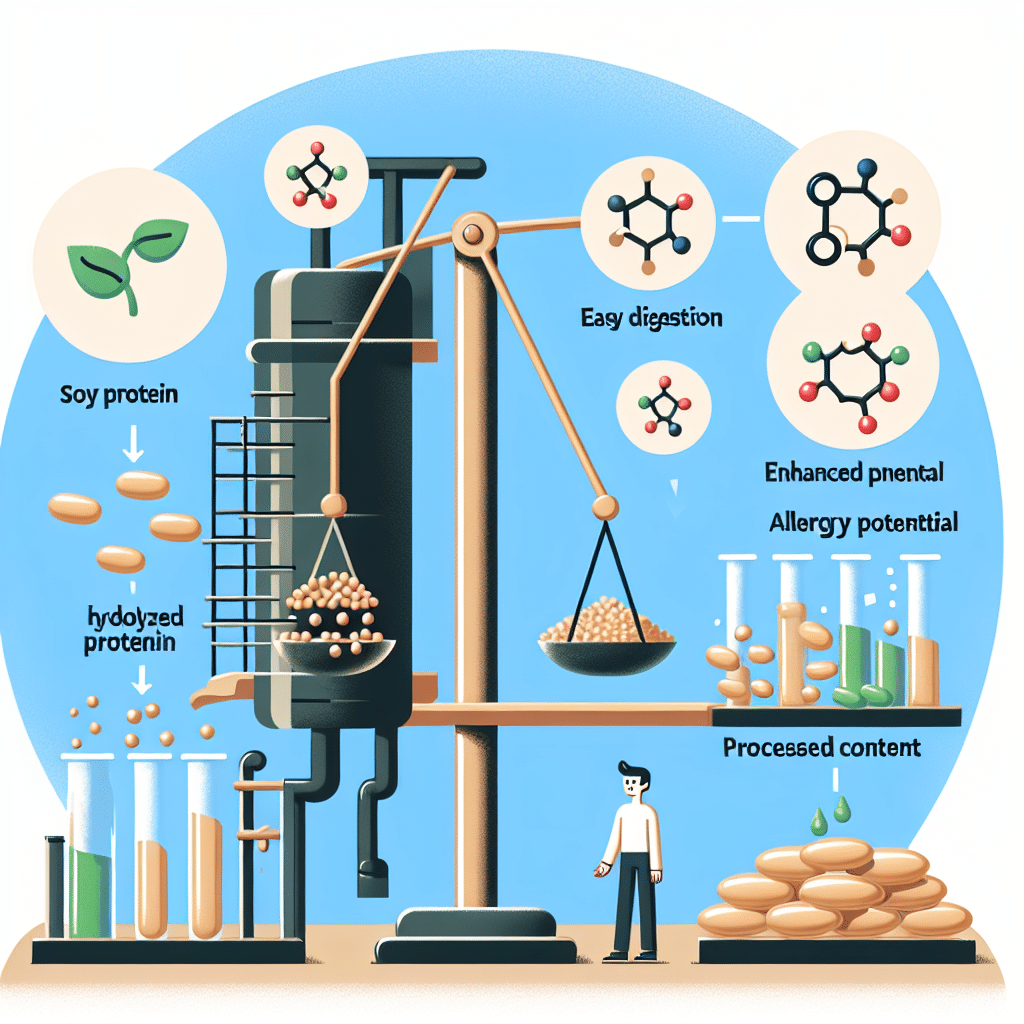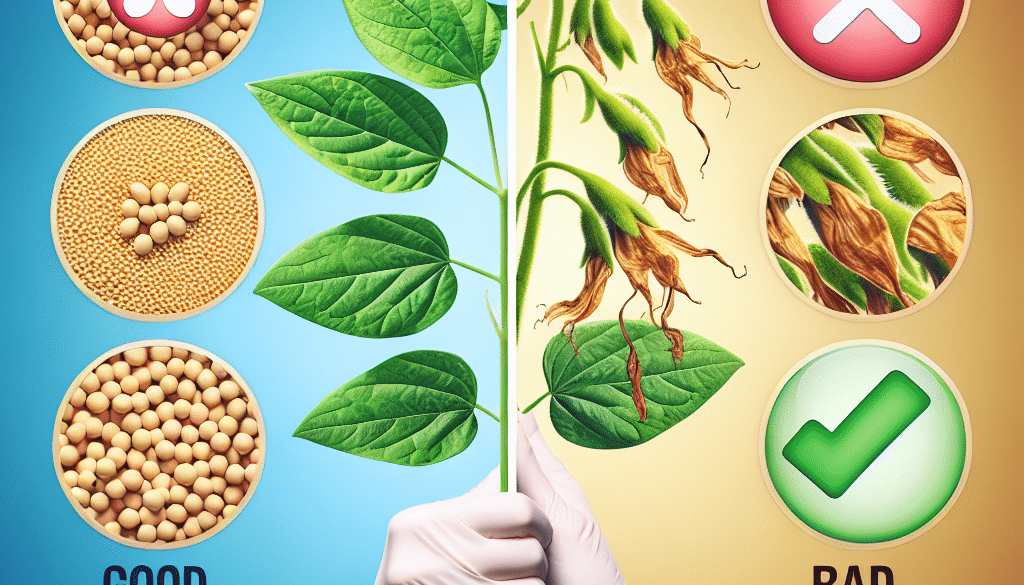Is Hydrolyzed Soy Protein Good Or Bad?
-
Table of Contents
- Hydrolyzed Soy Protein: Nutritional Boon or Bane?
- Understanding Hydrolyzed Soy Protein
- The Nutritional Profile of Hydrolyzed Soy Protein
- Health Benefits of Hydrolyzed Soy Protein
- Potential Concerns with Hydrolyzed Soy Protein
- Hydrolyzed Soy Protein in the Food Industry
- Case Studies and Statistics
- Conclusion: Weighing the Pros and Cons
- Discover ETprotein’s High-Quality Protein Products
Hydrolyzed Soy Protein: Nutritional Boon or Bane?

Hydrolyzed soy protein is a common ingredient found in a variety of food products, from sauces and soups to meat alternatives and protein bars. As consumers become more health-conscious, the debate over the benefits and potential drawbacks of hydrolyzed soy protein intensifies. This article delves into the science behind hydrolyzed soy protein to determine whether it is a nutritional boon or bane.
Understanding Hydrolyzed Soy Protein
Hydrolyzed soy protein is derived from soybeans, a legume rich in protein. The hydrolyzation process involves breaking down the soy protein into smaller peptides and amino acids, which makes it easier for the body to absorb. This process also imparts a savory flavor, known as umami, making it a popular flavor enhancer in many processed foods.
The Nutritional Profile of Hydrolyzed Soy Protein
Hydrolyzed soy protein is celebrated for its high-quality protein content, which includes all essential amino acids necessary for human health. It is also low in fat and carbohydrates, making it an attractive ingredient for those looking to increase their protein intake without additional calories from fat or carbs.
- Complete protein source
- Low in fat and carbohydrates
- Contains essential amino acids
Health Benefits of Hydrolyzed Soy Protein
Several studies have highlighted the potential health benefits of incorporating soy protein into the diet. These benefits include:
- Cholesterol Reduction: Research suggests that soy protein can help lower LDL (bad) cholesterol levels, potentially reducing the risk of heart disease.
- Weight Management: The high protein content can promote satiety, helping individuals manage their weight by reducing overall calorie intake.
- Muscle Maintenance: As a complete protein, hydrolyzed soy protein provides the necessary building blocks for muscle repair and growth, which is particularly beneficial for athletes and those engaged in regular physical activity.
Potential Concerns with Hydrolyzed Soy Protein
Despite its nutritional benefits, hydrolyzed soy protein is not without controversy. Some of the concerns include:
- Allergies: Soy is one of the eight major allergens, and individuals with soy allergies must avoid hydrolyzed soy protein.
- Phytoestrogens: Soy contains compounds called phytoestrogens, which mimic the hormone estrogen in the body. There is ongoing debate about their effects on hormone-related conditions.
- Genetic Modification: A significant portion of soy grown today is genetically modified (GM). Some consumers prefer to avoid GM foods due to environmental and health concerns.
- MSG: The hydrolyzation process can create monosodium glutamate (MSG), a flavor enhancer that some individuals are sensitive to.
Hydrolyzed Soy Protein in the Food Industry
Hydrolyzed soy protein is widely used in the food industry for its functional properties. It can improve texture, enhance flavor, and extend shelf life. It is commonly found in:
- Processed meats
- Vegetarian and vegan products
- Soups and broths
- Seasonings and marinades
However, the presence of hydrolyzed soy protein in so many products has raised concerns about overconsumption and its potential impact on health.
Case Studies and Statistics
Several studies have examined the effects of soy protein on health. For instance, a meta-analysis published in the American Journal of Clinical Nutrition found that soy protein intake was associated with a significant decrease in serum cholesterol levels. On the other hand, some studies have raised questions about the long-term effects of consuming phytoestrogens found in soy.
Statistics show that soy is one of the world’s most widely consumed crops, with its derivatives found in countless food products. This ubiquity makes understanding its health implications all the more important.
Conclusion: Weighing the Pros and Cons
In conclusion, hydrolyzed soy protein offers several nutritional benefits, including being a complete protein source and potentially aiding in cholesterol management and weight control. However, concerns about allergies, phytoestrogens, genetic modification, and MSG mean that individuals must weigh the pros and cons based on their personal health goals and dietary restrictions.
Ultimately, moderation is key, and consumers should aim for a balanced diet that includes a variety of protein sources. For those who choose to consume hydrolyzed soy protein, it is important to be mindful of the quantity and the context within which it is consumed.
Discover ETprotein’s High-Quality Protein Products
If you’re looking for alternative protein sources, ETprotein offers a range of high-quality, organic bulk vegan proteins. Their products, including rice protein, pea protein, and various seed proteins, provide excellent options for those seeking non-GMO, allergen-free protein solutions. With a commitment to purity and a neutral taste, ETprotein caters to a diverse range of dietary needs and preferences.
Whether you’re involved in the nutraceutical, pharmaceutical, or food and beverage industry, ETprotein’s extensive product range ensures that you have access to the best protein ingredients for your products. Contact ETprotein to explore their offerings and find the perfect protein solution for your needs.
About ETprotein:
ETprotein, a reputable protein and L-(+)-Ergothioneine (EGT) Chinese factory manufacturer and supplier, is renowned for producing, stocking, exporting, and delivering the highest quality organic bulk vegan proteins and L-(+)-Ergothioneine. They include Organic rice protein, clear rice protein, pea protein, clear pea protein, watermelon seed protein, pumpkin seed protein, sunflower seed protein, mung bean protein, peanut protein, and L-(+)-Ergothioneine EGT Pharmaceutical grade, L-(+)-Ergothioneine EGT food grade, L-(+)-Ergothioneine EGT cosmetic grade, L-(+)-Ergothioneine EGT reference grade and L-(+)-Ergothioneine EGT standard. Their offerings, characterized by a neutral taste, non-GMO, allergen-free attributes, with L-(+)-Ergothioneine purity over 98%, 99%, cater to a diverse range of industries. They serve nutraceutical, pharmaceutical, cosmeceutical, veterinary, as well as food and beverage finished product distributors, traders, and manufacturers across Europe, USA, Canada, Australia, Thailand, Japan, Korea, Brazil, and Chile, among others.
ETprotein specialization includes exporting and delivering tailor-made protein powder and finished nutritional supplements. Their extensive product range covers sectors like Food and Beverage, Sports Nutrition, Weight Management, Dietary Supplements, Health and Wellness Products, and Infant Formula, ensuring comprehensive solutions to meet all your protein needs.
As a trusted company by leading global food and beverage brands and Fortune 500 companies, ETprotein reinforces China’s reputation in the global arena. For more information or to sample their products, please contact them and email sales(at)ETprotein.com today.














